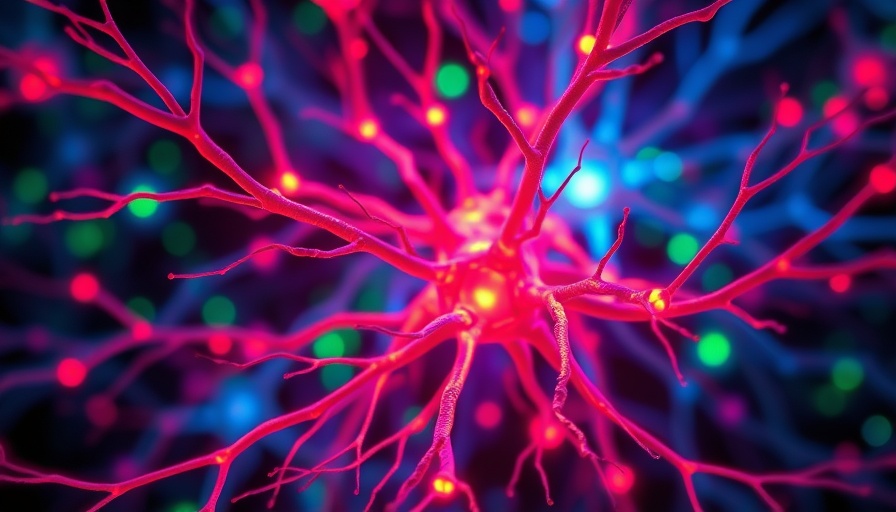
Groundbreaking Research Reveals Astrocytic Dysfunction in Alzheimer's Disease
A recent study from the University of Kentucky's Sanders-Brown Center on Aging has significantly advanced our understanding of Alzheimer's disease by uncovering critical communication breakdowns between astrocytes—star-shaped support cells in the brain—and blood vessels. This fundamental research, published in the Journal of Neuroscience, highlights how disruptions in astrocytic function and calcium signaling can lead to impaired blood flow and energy supply in the brain, further exacerbating cognitive decline.
The researchers have identified a 'weak link' in the communication pathway between astrocytes and vascular elements, suggesting that astrocytic reactivity in Alzheimer's alters their interactions with blood vessels, leading to a disordered delivery of metabolic support to neurons. As noted by senior author Dr. Chris Norris, this opens up new avenues for treatment strategies targeted at restoring normal blood flow and cellular interaction in aging brains affected by Alzheimer's.
Astrocytes: The Unsung Heroes of Brain Health
Astrocytes perform several vital roles in the central nervous system (CNS), including maintaining the blood-brain barrier, modulating neurotransmitter levels, and providing metabolic support to neurons. In healthy conditions, these cells work in synchrony with blood vessels to ensure the brain receives the necessary oxygen and nutrients. However, in Alzheimer's disease, the functional status of astrocytes can shift dramatically due to neuroinflammation, contributing to neurodegeneration and memory deficits.
Emerging research, including a comprehensive review from the International Journal of Molecular Sciences, has shown that astrocytes not only participate in maintaining brain homeostasis but can also exhibit neurotoxic effects under certain pathological conditions, exacerbated by the presence of amyloid-beta. This dual nature underscores the need for therapeutic approaches that can selectively target astrocyte reactivity without compromising their protective functions.
Calcium Signaling: A Crucial Mechanism in Alzheimer's Pathology
One of the key findings of this new research is the alteration in calcium signaling within astrocytes. The team found that in mouse models simulating Alzheimer's-like changes, astrocytes displayed hyperactive and desynchronized calcium dynamics, contributing to the disorganized nutrient delivery across the glucose-sensing astrocytes and leading to degraded cognitive functions.
Calcium dysregulation not only impacts astrocytes but also affects the entire neuronal network, compelling researchers to explore therapies aimed at stabilizing calcium signaling as a potential intervention to combat cognitive decline. Several studies, such as those published in the Journal of Neuroscience, highlight the critical role calcium plays in astrocytic function and its implications for excitotoxicity and neuroinflammation in Alzheimer's.
The Future of Alzheimer's Therapeutics: Astrocytes as Targets
As the understanding of astrocytic functions deepens, novel treatment strategies are being conceptualized, focusing on modulating astrocyte behavior. Current approaches could include pharmacological methods that aim to restore the protective properties of astrocytes while reversing their reactive state, thereby enhancing cognitive functions. Alongside traditional drug discovery, a growing area of interest is the development of dietary interventions and lifestyle modifications that foster astrocyte health.
Nutrition, particularly diets rich in omega-3 fatty acids and antioxidants, have shown promise in preclinical models for enhancing astrocytic functionality and protecting against neurodegeneration. For example, interventions involving melatonin and ketogenic diets have demonstrated potential in ameliorating cognitive impairments and restoring astrocytic functions.
Conclusion: An Encouraging Horizon
This study provides valuable insights into understanding the molecular mechanisms implicated in Alzheimer's disease. By identifying astrocytes as critical players in the pathology due to their interactions with blood vessels and calcium dysregulation, researchers can guide future investigations toward innovative therapeutic strategies. As we pivot towards a more integrated view of Alzheimer's treatment focusing on glial cells, the potential for novel therapies targeting astrocytic reactivity stands to reshape the landscape of Alzheimer's disease management.
 Add Element
Add Element  Add Row
Add Row 




Write A Comment